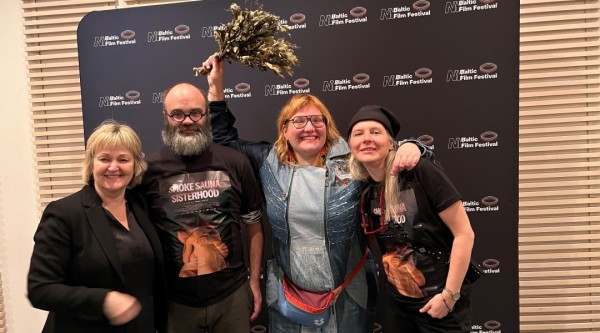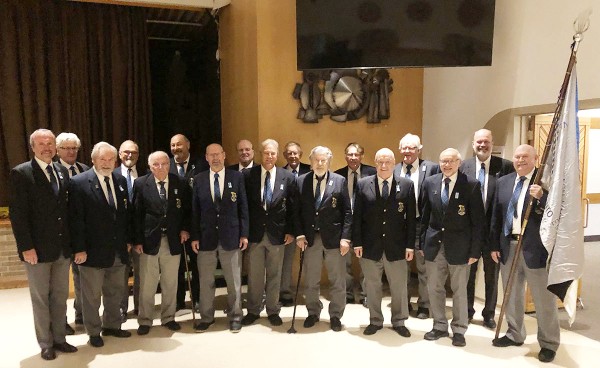Tätte and Matvere play live at the Esto House
Is it live, or is it Memorex? According to an old commercial, with eyes closed one would have a hard time establishing the presence Ella Fitzgerald’s voice - was it recorded or was she in the room, singing to you in person. The claim was to the quality of the tape, not of the performance.
However, no matter what Memorex may have said, live performance has a much more magical feel, a quality of the now and never again, that no recorded studio session can ever convey.
Jaan Tätte and Marko Matvere are legendary in Estonia for their live performances, sessions of simplicity, where two long-time friends pick up a guitar, banjo, squeezebox, or whatever is at reach, and simply strum, play and sing. Just sing, capturing the moment.
The poet Artur Alliksaar wrote that there is but the one moment, the one in which we are living. There is no past, no future, and such is also the quality of those musical performances that transcend all external, ignore time , except by acknowledging the here and now.
Tätte and Matvere earn their living from the stage, almost as renaissance men - as actor, playwright, producer, director. Matvere was one of the hosts of the Eurovision 2002 contest held in Estonia and is also the key performer, composer behing the Estonian traditional music ensemble Väikeste Lõõtspillide Ühing. It seems that performing, or creating for performance is what the two do best, and in their recorded efforts that have reached theses shores plenty of confirmation exists about a dedication to the craft of simplicity and beauty.
In 1995 the duo recorded a cassette’s worth of material that they had been playing together for years, of folk tunes as well as their originals, some lyrics were their own, others from legendary Estonian poets Henrik Visnapuu, Heiti Talvik and Ilmar Laaban. The copyright of the originals covers 1984 1995. Pressure from friends who had worn out their tapes from frequent playing led to the release of the CD Majakavahi Armuhüüd (Lovecry of the Lighthouse-keeper) in 2000, made from the master of the original sessions as answer for those who wanted a more long-lasting form of recording. The Memorex of the mind still wants confirmation, evidently.
While Matvere has recorded regularly with his ensemble, and his CDs are always an anticipated delight, Tätte’s solo release, Minemine, of 2001 was long in coming, covering some old tunes of the two as well as a number of originals. Pensive, deeply introspective and sensitive, Tätte’s CD is the accomplishment of a musician of extraordinary breadth, deep of voice and profound of meaning. One of the best recent platters to be heard in any language, is the quite unabashed personal opinion expressed here.
Thus, when the Tallinna Linnateater came to Toronto last week on their North American tour to perform Tätte’s play Palju õnne argipäevaks (difficult to translate into mere words. Happy workaday, which is what the sentiment means, is inadequate), with both Tätte and Matvere playing the male roles, it was hoped that the troubadours would find a chance to weave their musical artistry as well.
Fortunately, the opportunity was found, last Thursday the two played to a full house in the Toronto E. House pub. Which is unfortunately a poor venue for introspective gems, the meat and potatoes of Tätte and Matvere’s repertoire. Poorly ventilated and cramped, the pub suits performances that feature volume over emotion much better, as proven by blues and rock shows of the past.
Initially this did not seem to hinder the performers. Their easy familiarity was immediately evident, with their repertoire, each other, and comfort with the audience. They are, after all, performers, actors and raconteurs, their polished performance was proof.
But, something was missing. Was it the locale? Travel fatigue? A bibulous patron or two paying less attention than should have been polite? The television crew present should not have affected the performances which never built up a real head of steam. As an example, a comment about but two of the songs that one expected to hear, and were indeed performed. Sure, Tätte’s splendid “Silveri laul” was delivered, technically if possible even better than on the 2000 CD. “Dollarilaul”, Tätte’s lyrics to Evert Taube’s melody, also shone. But - one would have wished to hear more of the breadth of their voices - both Matvere and Tätte have wonderfully expressive range, particularily in the lower registers. It was apt perhaps, that they ended their performance with the Girl Guide bed-time standard, “Nüüd uni tule rutuga”. Nobody had been lulled to sleep by their show, but it was understood that tomorrow is another day.
Perhaps this kvetching is Dickensian - an admitted fan went to the show with Great Expectations and they fell a Pip short of being realized. It may very well be, that one has to catch Tätte and Matvere in a more homey atmosphere, say on Vilsandi, around a campfire, with seagulls adding their harmony to the tunes.
A welcome addition to the evening was the appearance of producer Andrus Vaarik, begrimed and disguised as an old coot, ready to comment on present day Estonian politics as best as possible. His stand-up comedy fed off the audience participants, particularily those well-lubricated ones standing near the bar, and justifiably drew guffaws and laughs throughout. The timing was impeccable, and although it did seem that the material was toned down for the Toronto audience, maybe people were unaware of some of the characters or situations that were poked at. But any time that commies and pinkos are in your sights, no biting salvo is poor or misses the target, and the public recognized this with extended and hearty applause.
As two showings of the play were slated for the next day, the duo played only one lengthy set; rightfully, it seems, as theatre-goers the next day had nothing but praise for the energy shown on the stage.
It was nice to notice that Tätte’s Minemine CD was on sale at the pub, patrons who bought it may have been unaware that it is not the easiest disc to source back home. Majakavahi Armuhüüd is, apparently, even more of a rarity.
Tätte’s “Vilsandi laul” , the 2001 recorded version, was the one that dominated these ears on the drive home. The pub performance was fine, make no mistake. But this was one of these times where Memorex was better than live. Yet, also one that suggested that one day, in the proper surroundings, the Two Troubadours may still capture for these ears the magical Alliksaar moment - the immediate musical now -, unaffected by what was when, and what may one day be.
Troubadours two in TO
Kultuur
TRENDING
























